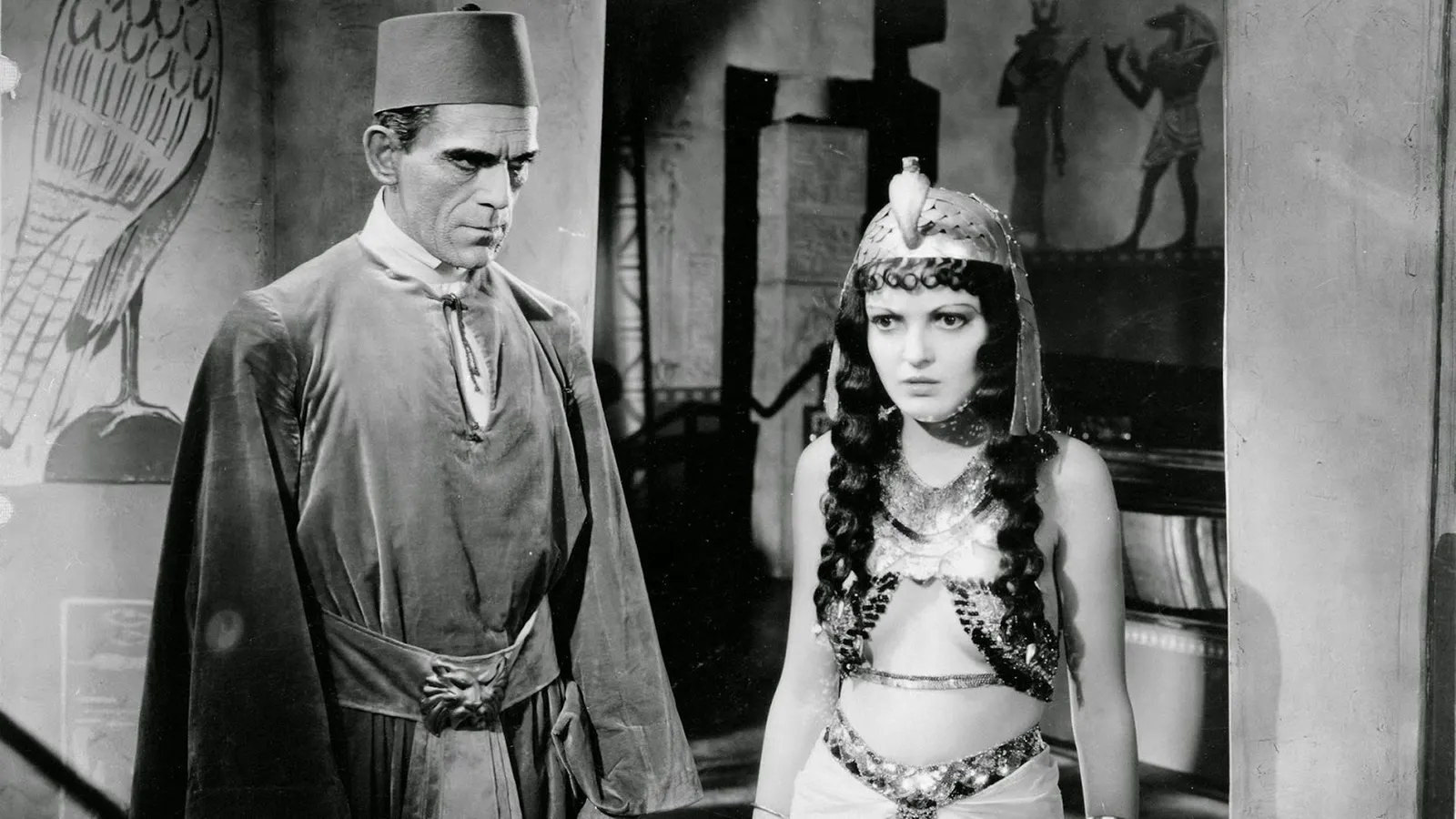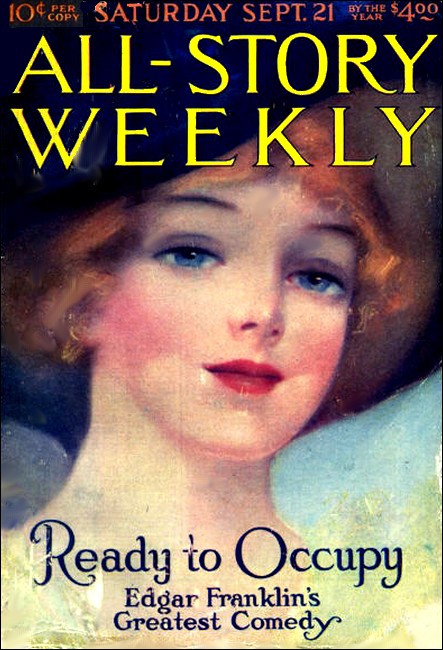BEHIND THE CURTAIN (1)
By:
May 29, 2023

“Behind the Curtain” was originally published in the September 21, 1918 issue of All-Story Weekly. HiLoBooks is pleased to serialize it here for HILOBROW’s readers.
ALL INSTALLMENTS: 1 | 2 | 3 | 4.
It was after nine o’clock when the bell rang, and descending to the dimly lighted hall I opened the front door, at first on the chain to be sure of my visitor. Seeing, as I had hoped, the face of our friend, Ralph Quentin, I took off the chain and he entered with a blast of sharp November air for company. I had to throw my weight upon the door to close it against the wind.
As he removed his hat and cloak he laughed good-humoredly.
“You’re very cautious, Santallos. I thought you were about to demand a password before admitting me.”
“It is well to be cautious,” I retorted. “This house stands somewhat alone, and thieves are everywhere.”
“It would require a thief of considerable muscle to make off with some of your treasures. That stone tomb-thing, for instance; what do you call it?”
“The Beni Hassan sarcophagus. Yes. But what of the gilded inner case, and what of the woman it contains? A thief of judgment and intelligence might covet that treasure and strive to deprive me of it. Don’t you agree?”
He only laughed again, and counterfeited a shudder.
“The woman! Don’t remind me that such a brown, shriveled, mummy-horror was ever a woman!”
“But she was. Doubtless in her day my poor Princess of Naarn was soft, appealing; a creature of red, moist lips and eyes like stars in the black Egyptian sky. ‘The Songstress of the House’ she was called, ere she became Ta-Nezem the Osirian. But I keep you standing here in the cold hall. Come upstairs with me. Did I tell you that Beatrice is not here tonight?”
“No?” His intonation expressed surprise and frank disappointment. “Then I can’t say good-by to her? Didn’t you receive my note? I’m to take Sanderson’s place as manager of the sales department in Chicago, and I’m off tomorrow morning.”
“Congratulations. Yes, we had your note, but Beatrice was given an opportunity to join some friends on a Southern trip. The notice was short, but of late she has not been so well and I urged her to go. This November air is cruelly damp and bitter.”
“What was it — a yachting cruise?”
“A long cruise. She left this afternoon. I have been sitting in her boudoir, Quentin, thinking of her, and I’ll tell you about it there — if you don’t mind?”
“Wherever you like,” he conceded, though in a tone of some surprise. I suppose he had not credited me with so much sentiment, or thought it odd that I should wish to share it with another, even so good a friend as he. “You must find it fearfully lonesome here without Bee,” he continued.
“A trifle.” We were ascending the dark stairs now. “After tonight, however, things will be quite different. Do you know that I have sold the house?”
“No! Why, you are full of astonishments, old chap. Found a better place with more space for your tear-jars and tombstones?”
He meant, I assumed, a witty reference to my collection of Coptic and Egyptian treasures, well and dearly bought, but so much trash to a man of Quentin’s youth and temperament.
I opened the door of my wife’s boudoir, and it was pleasant to pass into such rosy light and warmth out of the stern, dark cold of the hall. Yet it was an old house, full of unexpected drafts. Even here there was a draft so strong that a heavy velour curtain at the far side of the room continually rippled and billowed out, like a loose rose-colored sail. Never far enough, though, to show what was behind it.
My friend settled himself on the frail little chair that stood before my wife’s dressing-table. It was the kind of chair that women love and most men loathe, but Quentin, for all his weight and stature, had a touch of the feminine about him, or perhaps of the feline. Like a cat, he moved delicately. He was blond and tall, with fine, regular features, a ready laugh, and the clean charm of youth about him — also its occasional blundering candor.
As I looked at him sitting there, graceful, at ease, I wished that his mind might have shared the litheness of his body. He could have understood me so much better.
“I have indeed found a place for my collections,” I observed, seating myself near by. “In fact, with a single exception — the Ta-Nezem sarcophagus — the entire lot is going to the dealers.” Seeing his expression of astonished disbelief I continued: “The truth is, my dear Quentin, that I have been guilty of gross injustice to our Beatrice. I have been too good a collector and too neglectful a husband. My ‘tear-jars and tombstones,’ in fact, have enjoyed an attention that might better have been elsewhere bestowed. Yes, Beatrice has left me alone, but the instant that some few last affairs are settled I intend rejoining her. And you yourself are leaving. At least, none of us three will be left to miss the others’ friendship.”

RADIUM AGE PROTO-SF: “Radium Age” is Josh Glenn’s name for the nascent sf genre’s c. 1900–1935 era, a period which saw the discovery of radioactivity, i.e., the revelation that matter itself is constantly in movement — a fitting metaphor for the first decades of the 20th century, during which old scientific, religious, political, and social certainties were shattered. More info here.
SERIALIZED BY HILOBOOKS: James Parker’s Cocky the Fox | Annalee Newitz’s “The Great Oxygen Race” | Matthew Battles’s “Imago” | & many more original and reissued novels and stories.
